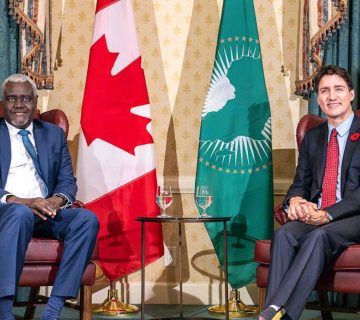The recent move by Somalia to sever diplomatic ties with Kenya over what it called ‘internal interference’ is the latest of diplomatic spats between the two neighborly countries. Cooperation between the two countries, connected by the Somali ethnic community that straddles the Kenya-Somalia border, has deep historical roots, but relations between them have seen times of flourish and times of dissonance. At stake, are the livelihoods of millions of Kenyans and Somalis who have nurtured political, social, cultural, and economic relations that predate the colonial period. If the current diplomatic standoff graduates to full-scale conflict, there would be serious political and security implications on the greater Horn of Africa – an upshot that each country should be keen to avoid.
Fated by Europe’s arbitrary cartography of Africa, later on, cemented by Organization of African Unity OAU’s Cairo Resolution 16(I) 1964 that committed to the maintenance of colonial borders upon independence, Kenya and Somalia are eternal neighbors who by all means must coexist. While the two countries have maintained diplomatic and trade relations since independence, such cooperation has been peppered by suspicion. Mogadishu’s move to cut diplomatic ties with Kenya this month is perhaps one of the most significant highlights of the nadir between the two countries. The other is the maritime dispute in which the former sought legal interpretation at the International Court of Justice in 2014. In various fora, a cross-section of maritime experts and scholars have urged Nairobi and Mogadishu to adopt a conciliation framework to resolve the dispute.
Such disagreements notwithstanding, both countries have been working together to improve the political and security situation in Somalia. In the wake of the increased al Shabab threat in the region, the Kenya Defence Forces (KDF) launched an offensive against the group defined by military intervention and intelligence in 2012. Since then, KDF, now under African Union Mission in Somalia (AMISOM), has scored several important successes particularly in pushing the group from Mogadishu and many of its strongholds in the southern part of Somalia. AMISOM has also played a leading role in protecting transitional and federal governments, as well as national electoral processes. Suffice it to say, AMISOM has created political space for Somalia’s political leadership to restore democratic governance.
Despite these gains, the subdued al Qaida-affiliated group remains committed to attacking soft targets and military installations in the region. Perhaps, their more immediate goal is to disrupt the Somalia elections slated between December 2020 and February 2021. Several factors are emboldening it: first, the intention by the US to withdraw its small but critical contingent of troops from Somalia; second, AMISOM’s plan to transfer its responsibilities to Somalia’s National Army by 2021; third, Ethiopia’s federal government’s alleged withdrawal of a section of its troops from Somalia in early November 2020 as it focused on the Tigray conflict; and lastly, Mogadishu’s diplomatic squabble with her neighbor, Kenya. All these factors are conspiring to give al Shabab a permissive strategic environment with which they can plan their activities. With conditions in Somalia becoming more favorable to them, it would be a mistake to write off the group’s resurgence.
Consequently, the current political and security state in Somalia and its likely implications on the Horn of Africa region require that Mogadishu demonstrate political wisdom by de-escalating tensions with Kenya. The move will give the two countries a chance to deepen strategic cooperation and create stable bilateral relations. The federal government should also focus on delivering a democratic moment through free and fair elections while working towards the realization of the Somalia Transition Plan (STP) in which the Somali National Army demonstrates competence, resilience, and patriotism as it seeks to replace AMISOM troops.
Daniel Iberi is the Strategic Communications Manager at HORN International Institute for Strategic Studies



